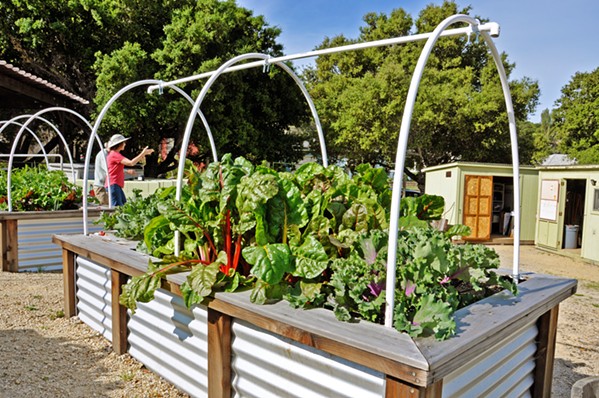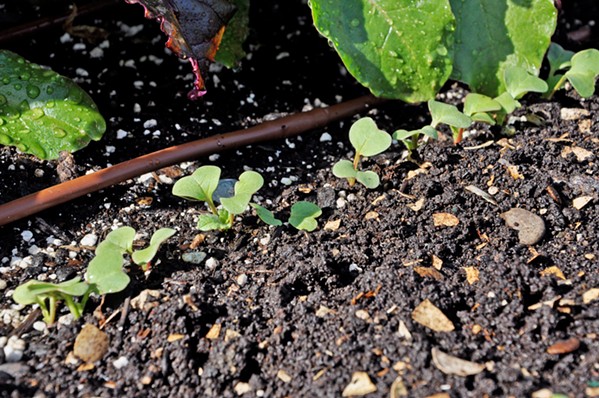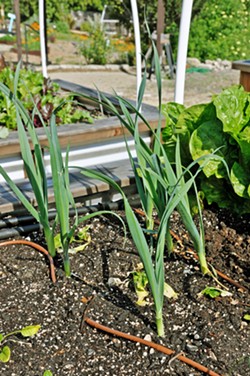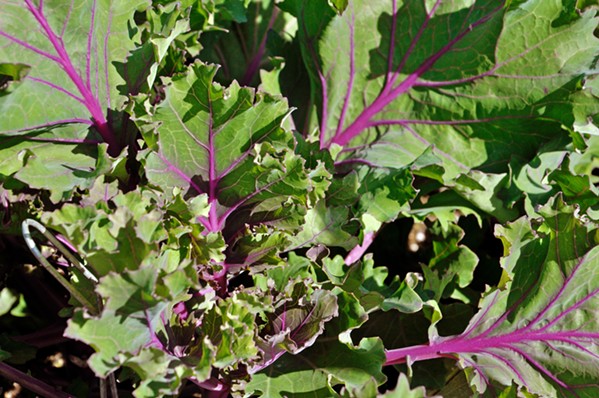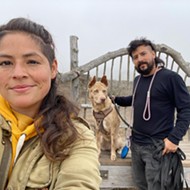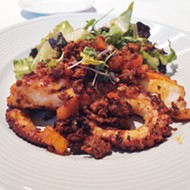DIY with classes at the UC Cooperative Extension in gardening and food preservation
By Camillia Lanham[{
"name": "Ad - Medium Rectangle CC01 - 300x250",
"id": "AdMediumRectangleCC01300x250",
"class": "inlineCenter",
"insertPoint": "8",
"component": "2963441",
"requiredCountToDisplay": "12"
},{
"name": "Ad - Medium Rectangle LC01 - 300x250",
"id": "AdMediumRectangleCC01300x250",
"class": "inlineCenter",
"insertPoint": "18",
"component": "2963441",
"requiredCountToDisplay": "22"
},{
"name": "Ad - Medium Rectangle LC09 - 300x250",
"id": "AdMediumRectangleLC09300x250",
"class": "inlineCenter",
"insertPoint": "28",
"component": "3252660",
"requiredCountToDisplay": "32"
}]
A soft-hued planter full of pale gray-greens and purple flowers waits just through the gate of the Garden of the Seven Sisters off Sierra Way. Those winter colors will soon be replaced by flora made just for spring. This "curbside garden" is the first of 15 demonstration plots manned by Master Gardener Program volunteers at the UC Cooperative Extension in San Luis Obispo.
Farther along the two-thirds of an acre parcel, apple and pear trees are pruned to grow along the fence, succulents and drought-tolerant plants populate the center, and an orchard of stone fruit bears flowers waiting for pollination. Six planters full of winter veggies are being showered with water from a hose.
The kitchen garden plot is what brought me here today. An array of cold season edibles wait to be plucked from soft, nutrient rich soil. Radish starts bask in the mid-morning sun. Bright rainbow chard and purple kale, lush heads of lettuce, and turnip tops showing through recently wetted dirt are making me wish I had gotten my act together this winter.
There's no better feeling than lazily traipsing out to your own garden to pluck vegetables for a fresh garden-to-table meal you're preparing in your own kitchen. I also hate going to the grocery store to purchase crappy produce, because the fresh vegetables from my backyard taste so much better. Maybe all the rocky ups and downs and hard labor that went into my garden last year are what made my tomatoes, eggplant, zucchini, and peppers taste so good, I don't know. But gardening is freakin' hard.
If you're a newbie like I am—or an oldie looking for some new tricks—the UC Cooperative Extension in San Luis Obispo County has got something just for you. Whether you're trying to figure out what to do with all of that extra produce on your kitchen counter or trying to decide exactly what to plant and when, there's probably a class for that either through the extension's Master Gardener Program or Master Food Preserver Program. You can become certified as a master and volunteer for either program or both programs, or you can dabble with a class here or there.
Master Gardener Program Coordinator Maria Murrieta said if you're just starting out, it's best to begin small with transplants (not seeds). She recommends lettuces and chards because they get leafy and showy, something that can be satisfying for new gardeners. But even if you're an ambitious and seasoned gardener, pests can ruin a good crop—so Murrieta said it's also good to know where you can go for help.
"One of the best things they can do is know what resources are available—whether it's talking to the people at local nurseries or calling the helpline," Murrieta said. "It's good to know what your resources are because there's just a ton of information out there, and if you just start Googling it, that information is not always going to be reliable."
The program has helplines in Templeton, Arroyo Grande, and San Luis Obispo that are staffed by certified Master Gardeners who live in those specific areas of the county. Although volunteers aren't always in the office, they check messages and emails and are quick with responses. She said about 105 volunteers are on the job, helping out in the demonstration garden, being a resource for garden-weary residents, and teaching classes.
"They can commiserate, they can help out with advice, they know what grows there and what doesn't," Murrieta said. "It's what they like to do, and they get to talk to their people about it."
They also harvest the edible products from the demonstration garden. For edible nibbles, the gardeners tend the kitchen garden, a dry farming plot, a fruit and nut orchard, and a vertical edible garden. In collaboration with Glean SLO and the Food Bank of San Luis Obispo County, the fruits and veggies are harvested and donated to the food bank. Murrieta said that sometimes the Master Food Preservers also use some of the products, should they fall in line with their workshops.
The two programs are working together right now on finding a good pickling cucumber. Master Food Preserver Program Coordinator Dayna Ravalin said that it's hard to find the right kind of cucumbers for brining and pickling locally. So a Master Gardener found some pickling cucumber seeds in a seed catalog and is going to see how they do this year.
The Master Food Preserver Program is a separate and newer entity for the extension—it became a statewide UC supported program in 2013. Locally, the SLO County UC Cooperative Extension preserver program covers both Santa Barbara and San Luis Obispo counties (Santa Barbara County has its own Master Gardener Program) with a small cohort of 27 volunteers.
Preservers work with the Food Bank of San Luis Obispo County, as well, to talk about food safety with the individuals who are receiving produce from the food bank, Ravalin said. Volunteers demonstrate basic food preservation that is easy to do at home and doesn't require any fancy ingredients or special equipment.
"We're really just trying to help them maximize the life of their produce," Ravalin said. "They receive at times quite a bit, and this way we can help them extend the safe production of that produce down the road."
They walk food bank clients through the proper ways to trim and care for produce, how to dry and freeze it, and also how to make things like refrigerator pickles: "It's just taking their produce and making a brine and putting it in their refrigerator," she said.
Volunteer Master Food Preservers operate in a similar way to the Master Gardeners, teaching classes, doing demonstrations, and manning the helpline. They teach classes on boiling water canning, pressure canning, fermentation, drying and dehydration, and even soft cheese and butter making. Ravalin said that the most important thing to do if someone wants to venture into canning is read about safe canning techniques. Eating unsafely canned food can do a lot of damage and even be fatal.
"We don't recommend that people just kind of dive into making things like jam without doing some preliminary reading," Ravalin said. "One, it might not be safe, but two, it might not yield the most delicious product. ... Unfortunately we don't have moms and grandmas teaching us to do this anymore, so we have to go to the book or a class." Δ
Editor Camillia Lanham has a mom who does it all and gives advice freely. Send comments to [email protected].

